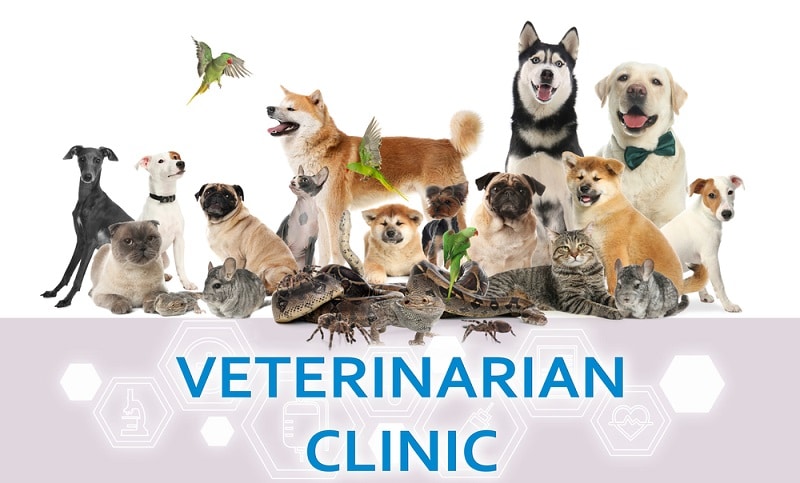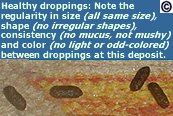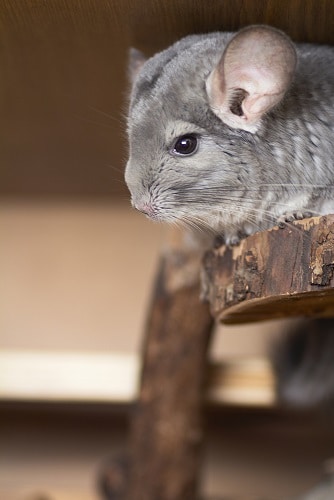
How Knowledgeable Is Your Vet?
Veterinary science has evolved with the popularity of chinchillas as pets; more knowledgeable and experienced exotics specialist vets were treating chinchillas today than were ten years ago. But the veterinary profession still has a ways to go concerning chins, they’re still a relatively uncommon pet, and vet training programs don’t spend as much time educating future vets on chinchillas as they probably should, at least in the U.S. A chinparent MUST ask questions, practice common sense, and think critically at all times when it comes to their chin’s health, just as we must do with human doctors because no profession is perfect. Our chins’ welfare, sometimes their very lives, depend on our diligence.
It is important to actually ASK and find out exactly how much chinchilla training and experience your exotics specialist vet has. We advise chinparents first to be knowledgeable themselves to intelligently interact with and help educate their vet if need be. We have shared information to help educate our vet, providing duplicates of chinchilla care books from our reference library (.doc) and occasionally recommending online articles for her to examine. In contrast, she frequently advises us on care questions that others send our way.
A good veterinarian will be happy to involve their client in discussing their pet’s condition, explaining what they are doing and why to ask questions and invite them being asked in return. A great vet will actively educate themselves about their client’s pets, researching problems, and double-checking their diagnosis. If you find an exotics specialist vet who has dealt successfully with the problem you’re facing, give their contact information to your vet so they can consult someone with practical experience. And if you’re given a negative prognosis or something doesn’t sound right to you, don’t be afraid to consult other vets and get a second, even third opinion!
Sometimes, unfortunately, vets will authoritatively state their assumption as fact, when in reality, they’re projecting based on their knowledge of other animals; we’ve also seen this happen on forums. We’ve heard of vets prescribing anti-fungal shampoo for chins with Ringworm, treating them as if they’re a dog or cat in that regard, or assuming that chins, like rabbits and cats, are prone to hairballs, or that chins are prone to bladder stones from “excess calcium” the way that rabbits and guinea pigs are, etc. If you don’t have a vet with a real working knowledge of and experience with chinchillas, then do what you can to help educate them and take an assertive role in overseeing your chin’s veterinary care.
Information Resources
- Vet Reference Books CA Chins
- Pet Prayer Line – put your sick pet on a prayer list
- VeterinaryPartner.com – often has chinchilla health articles
Articles: Choosing A Vet
- Choosing a Vet Spoiled Chins
- Choosing a Veterinarian CA Chins
- Finding a Vet Fetch by WebMD
Online Veterinary Advice
Pet Insurance
Articles
- Pet Insurance ASPCA
- Find Out Which Pet Insurance Is Right For You moderndog
- Who needs pet health insurance? Pet Health For Humans
- The best no or low pet insurance excess BOUGHTBYMANY
Available At
USA & International Vets Listed By Region
The following resources specialize in exotics. Contact them (in advance) with questions regarding their hours of operation, emergency accommodations and chinchilla experience.
USA Directory
Academy of Veterinary Dentistry
Dental Vets
See these nationwide (U.S.) vet listings! Especially if there is no specific state selection listed at right:
- American Animal Hospital Association
- Association of Exotic Mammal Veterinarians (AEMV)
- VetSpecialists Listings
- AVMA: American Veterinary Medical Association
- Chinchilla Club Vet Directory
- talktothevet.com
Arizona
Arkansas
California
- Adobe Animal Hospital
- All Creatures Veterinary Hospital
- Avian and Exotic Animal Hospital
- Peninsula Avenue Veterinary Hospital
Colorado
Connecticut
Florida
Georgia
Illinois
- Animal House of Chicago
- Dundee Animal Hospital
- Midwest Bird & Exotic Animal Hospital
- Ness Exotic Wellness Center
Indiana
Louisiana
Maine
Maryland
Massachusetts
Michigan
- Birmingham Veterinary Clinic
- Milwood Animal Clinic
- Second Chance Chin’s Chinchilla Rescue listing of SE lower and mid-Michigan vets
- Veterinary Care Specialists
Minnesota
Missouri
New Jersey
New York
North Carolina
Ohio
- All Creatures Animal Hospital
- Bird and Exotic Pet Wellness Center
- Fairfield Animal Hospital and Pet Center
- Mentor Veterinary Clinic
- Norton Road Veterinary Hospital
- West Park Animal Hospital
Oklahoma
Oregon
Pennsylvania
- Apple Creek Veterinary Hospital
- Ebensburg Animal Hospital
- Matthew J. Ryan Veterinary Hospital of the University of Pennsylvania
- Robinson Animal Hospital
- Smoketown Veterinary Hospital
- Wellsboro Veterinary Hospital
Tennessee
Texas
Utah
Virginia
Washington
West Virginia
International Directory
Academy of Veterinary Dentistry: Members Worldwide
WSAVA Global Veterinary Community
Belgium
Canada
German
Japan
Kenya
Netherlands
Singapore
UK
- Blackness Veterinary
- British Small Animal Veterinary Association
- Burnham House Veterinary Surgery
- Chinchilla PetForums
- The Chinchilla Club Forum
- Exotic Direct Vet Listing
- UK Pets.co.uk
- Valley Vets Limited
Initial Vet Examination Criteria And Detecting Illness
When you bring a chinchilla home, whether it’s your first or an addition to your “herd,” the new chin will require an appointment with an exotics specialist vet to be declared healthy and free of disease. If the chin is an addition, he must be kept apart (quarantined) from the others and the facilities they use until after he’s been examined by the vet. Until then, it’s vital that you wash hands and keep things, especially sanitary and separate between the addition and the resident chins. Chinchillas don’t require check-ups (or vaccinations) after their initial vet examination. Still, we strongly advise getting a yearly head x-ray because that is the only way to confirm and address malocclusion at the earliest stage.
Chinchillas themselves have few contagious diseases, but a chin that has been exposed to other animals (and their fecal droppings, etc.) should have blood samples drawn to conclude that he is indeed free and clear of disease, because other animals can carry diseases that are capable of infecting chins, like Pasteurella or Rabbit Viral Hemorrhagic Disease (RVHD). You can print out the list below and go over the points with your exotics specialist vet to ensure that at least these basics are covered in the new chin’s initial examination. This list may also be used as a checklist for routine health maintenance.
Ears and Paw Pads need to be examined and treated, if necessary, for dryness or callouses. Check for ear mites.
Eyes should be bright and clear. There should be no white, yellow, or milky discharge or any dampness in or around them. Dampness around the eye may indicate an advanced case of malocclusion, but usually, it’s just an eye irritation.
Fecal droppings/Crap/Excrement/Poop/Stool/Turds should be of consistent appearance, as in the example photo below, but do not overanalyze fecal droppings and expect them to always appear “perfect.” What is normal for droppings can vary somewhat between chins, and some chins normally produce quite large droppings.
Chinchillas practice Coprophagy, or, more accurately, Cecotrophy, they consume some of their own droppings as part of their normal digestive process. These droppings that differ from the final deposit are called “cecotropes.”
Don’t overreact at the first sign of smallish (constipation) or squashy fecal droppings!
A change in droppings is actually symptomatic of a problem rather than a problem in itself. Usually, the problem is related to some aspects of husbandry, such as: overfeeding treats, an abrupt addition or change in diet, or an environmental stress factor such as a chaotic environment, cagemate incompatibility, fear of other household pets, a major lifestyle change, or relocation, etc. Once the underlying problem has been addressed, e.g., the addition/ change in diet has been slowed or temporarily discontinued, etc., the fecal droppings will return to normal within a day or two. If the environmental stress factor is the stress of a move, say, if the chinparents have relocated or just brought their new chin home, then he may just need a little time to settle in.

As long as there are no other symptoms besides a change in fecal droppings (if there are, see an exotics specialist vet immediately), and as long as there isn’t rank-smelling diarrhea, then squashy droppings, even a regular case of diarrhea can be helped by trying ONE of these suggestions. Be aware, though, that although this will treat the SYMPTOM in the short term, if the underlying problem goes unaddressed, then the symptom will continue to recur:
- Administer acidophilus+ for small animals or Bene-Bac
- Offer a small piece of burnt toast (must be charred) or charcoal nuts
- Give the chin access to hay only (no water, treats, pellets) for 6-8 hours.
This will not cause GI stasis; chins can safely go up to 24 hours without water (this is vet verifiable; a state of extreme stress either mentally or physically can put a chin temporarily off his food or water) barring other complications and we’ve treated squashy droppings this way at our rescue for years.
The primary symptom of Giardia is VERY repugnant, strong-smelling diarrhea. Parasites, Giardia, in particular, are a contagious condition, and a new chin (or any chin with foul-smelling diarrhea) must be checked and cleared of this by an exotics specialist vet BEFORE contact with other chinchillas. This is not a common problem, but parasites can be present in the tap or well water, and this is why chins should have only distilled or filtered water.
Hard, unusually small fecal droppings are an indication of inadequate food intake or constipation. It is not unusual for a chin who is experiencing environmental stress or who is recovering from a recent operation, illness, or injury to eat less for a time until the stress factor is resolved or until he recovers from his condition and regains his full appetite.
Constipation can indicate a temporary intestinal blockage, sluggishness from lack of dietary fiber, or potentially GI stasis, but the far more likely and common cause of constipation is environmental stress, especially the stress of a move or from prolonged confinement in a smaller cage or carrier. If the latter is a possibility, give the chin extra out-of-cage exercise time and restore him to his larger cage at the earliest opportunity. A small piece of prune, fig, or a raisin can encourage gut motility as long as other symptoms are not present that would indicate illness rather than environmental stress. If an illness is suspected, see an exotics specialist vet immediately.
Fur needs to be looked at for signs of fur biting or fungus. Chins that check positive for fur biting should be considered NFB. Fungus, Ringworm, in particular, is a contagious condition that a new chin (or any chin exhibiting signs of fungus) must be cleared of BEFORE contact with any other chinchillas.
General Attitude should be observed to determine if there are any abnormalities of movement, response, or use of limbs. If the chin is acting limp and lethargic, check for diabetes or hypoglycemia. If he has a seizure, examine the many causes, and pursue a remedial course of action.
Heart and Lungs need to be listened to for health and clarity; the heart should be clear of murmurs. Chins that test positive for a heart murmur should be considered NFB. A wet nose and hair thinned around the nose (from pawing at it), accompanied by wheezing and sneezing, are signs of a cold or respiratory problem. Be aware that sometimes chins expel air sharply through their nose to clear it of some irritating particle. However, this is an infrequent occurrence, and it would be better to have the chin examined by your exotics specialist vet if in doubt.
Teeth should have dark orange enamel (outer coating), which indicates sufficient calcium levels in the body. Clear/ white or light yellow teeth indicate a serious calcium deficiency, which is a cause of environmental malocclusion. Still, only a head x-ray will confirm malocclusion at the earliest stage. Malocclusion is NOT always a “death sentence,” it may be reversible in the initial and mid-stages with vitamin C and calcium supplements, among other things. Your exotics specialist vet should check the growth of both molars and incisors to ensure that the teeth are properly aligned and are receiving sufficient wear. Incisors are readily observable, as in the photo illustration, but viewing molars requires the use of a veterinary otoscope.
Urine/Pee is darker in color than our light to medium yellow. Chinchilla urine ranges from dark yellow to reddish-orange in hue. If the urine is bright red or if blood, which is of a different consistency than urine, is visible in the urine, then the chin is passing blood and needs the immediate attention of an exotics specialist vet.
Something To Ponder
A pet’s love for his family is forever, unconditional, without qualification, without reservation, is pure and unselfish.
We, the caretakers of these wonderful animals, must never forget that our animals are dependent on us for their well being. We must provide them with food, water, shelter, and health care.
In return, they wag their tail, talk to us in their own way, purr in our ears, cuddle next to our bodies, play with us, lick us, provide us company, bring smiles to our faces and heart. Our pets are someone to talk to when we are lonely, cheer us up when we are blue, always there for us with unconditional love.
They give us so much more than they get. Imagine how it would be if the whole world acted like our pets. ~ author unknown
Lots of people talk to animals. Not very many listen, though. That’s the problem.
~ Benjamin Hoff, The Tao of Pooh

